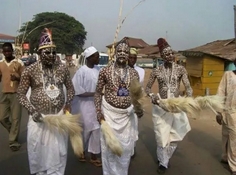
support@yorubalibrary.com
+2348073529208, 07038599574

The Oro Festival is one of the most significant and sacred festivals in Yoruba culture. This traditional celebration is deeply rooted in the religious and social fabric of the Yoruba people, highlighting their rich cultural heritage and spiritual beliefs.
Introduction to the Oro Festival
The Oro Festival is an annual event dedicated to the worship of Oro, a deity associated with justice, protection, and the enforcement of societal norms. The festival is marked by various rituals and ceremonies that are exclusively male-dominated, as women are traditionally prohibited from participating in or witnessing many aspects of the festival.
Historical Significance of the Oro Festival
The origins of the Oro Festival date back to ancient times, serving as a means to uphold justice and maintain order within the community. Oro is believed to act as a guardian of moral conduct, punishing wrongdoers and ensuring the adherence to societal rules. The festival is a time for the community to come together to reaffirm their commitment to these values.
Key Elements of the Oro Festival
1. Elders and Initiates
The festival is organized and led by the elders and initiated members of the Oro cult. These individuals are highly respected within the community for their wisdom and spiritual authority.
2. Sacred Groves and Shrines
Ceremonies often take place in sacred groves and shrines dedicated to Oro. These locations are considered hallowed ground, where the presence of the deity is most potent.
3. Oro Music and Chants
The sound of Oro music, characterized by drumming, chants, and the blowing of the Oro whistle, plays a crucial role in the festival. These sounds are believed to summon and appease the deity.
Rituals and Ceremonies
1. Proclamation of the Festival
The festival begins with a public proclamation by the elders, announcing the start of the celebrations. This proclamation is often accompanied by the beating of drums and blowing of horns.
2. Processions and Sacrifices
Initiated members conduct processions through the town, carrying sacred objects and performing rituals. Sacrifices, typically involving animals, are made to honor Oro and seek his blessings.
3. Night Ceremonies
Night time is considered particularly significant during the Oro Festival. It is believed that Oro is most active at night, and various secretive rituals take place. Women and non-initiates are required to stay indoors during these hours to avoid witnessing the sacred ceremonies.
The Role of Women
While women are generally excluded from direct participation in the Oro Festival, they still play a crucial supportive role. Women prepare food, maintain the household, and uphold other community duties, ensuring that the festival proceeds smoothly. Their understanding and respect for the traditions are essential for the festival's success.
Cultural and Social Impact
The Oro Festival serves as a powerful tool for social cohesion and cultural preservation. It reinforces community values, instills a sense of identity and pride among the Yoruba people, and ensures the transmission of cultural knowledge and practices to future generations.
Modern Adaptations and Continuity
In modern times, the Oro Festival continues to be celebrated, though some aspects have evolved to accommodate contemporary sensibilities and legal frameworks. Efforts are made to balance the preservation of traditional practices with respect for human rights and inclusivity.
Conclusion
The Oro Festival is a profound expression of Yoruba spirituality, culture, and community values. Its rituals and ceremonies highlight the deep connection between the Yoruba people and their traditions, emphasizing the importance of justice, protection, and moral conduct. Through the Oro Festival, the Yoruba community reaffirms its cultural heritage and passes on its rich legacy to future generations.
More reads
Oranmiyan Festival || Sango Festival || Ogun Festival || Igogo Festival || Osun Festival || New Yam Festival || Aje Festival

Learn about the Yoruba concept of Ìwà Pẹ̀lẹ́ (good…

Learn special praises for Divine Being and Creator…